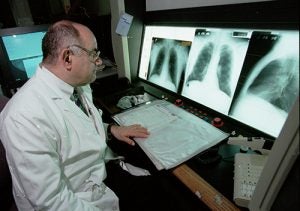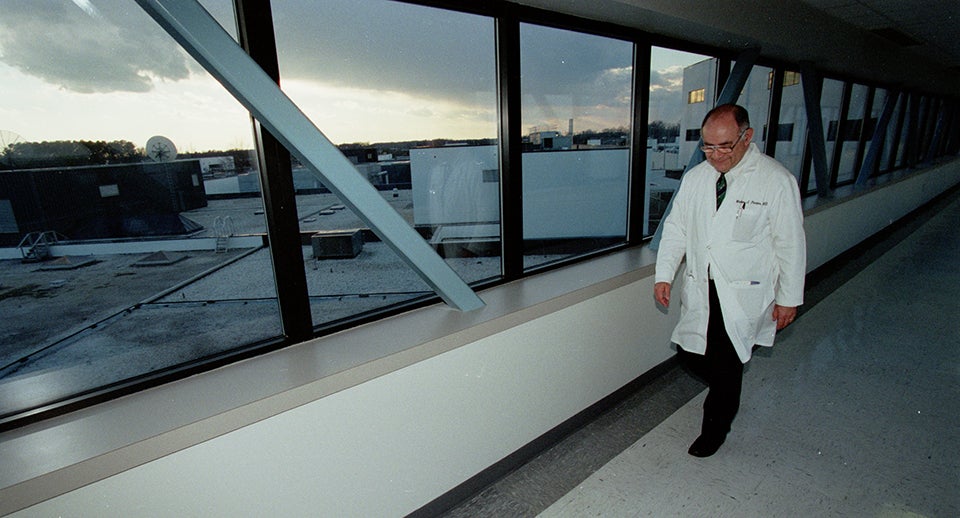Diabetes Remission
Journal: Weight-loss surgery should be a standard of care for some diabetes
A surgery developed at East Carolina University that can put an end to insulin shots for patients with diabetes has been recognized as a “standard of care” for some patients with the chronic disease.
More than 20 years after Dr. Walter Pories published evidence that a type of bariatric, or weight-loss, surgery led to a long-term remission of diabetes symptoms, the official journal of the American Diabetes Association, Diabetes Care, has said the operation should be considered a way to treat type 2 diabetes in patients who are obese.
“The thought was always that diabetes was an incurable, progressive disease, but with a fairly simple operation that takes about an hour, you can cure it,” said Pories, the founding chair of the Department of Surgery at ECU’s Brody School of Medicine. “We found that diabetes disappears completely between two to four days after surgery.”

Dr. Walter Pories examines patient x-rays in this file photo from 1998.
Type 2 diabetes is a long-term metabolic disorder characterized by high blood sugar, insulin resistance and a relative lack of insulin. Long-term complications include heart disease, stroke, blindness, kidney failure and poor circulation, which can result in limb amputation. It generally occurs as a result of obesity and not enough exercise, according to the National Institute of Diabetes and Digestive and Kidney Diseases and the World Health Organization.
In eastern North Carolina, 11 percent of the population suffers from diabetes, surpassing state and national averages. According to the ADA, 1.4 million people in the U.S. are diagnosed with diabetes every year.
“It’s an epidemic here, and it’s my belief that we have one of the highest diabetes rates in the United States,” Pories said in an interview this month with Public Radio East.
It affects African-Americans, who make up 22 percent of the state’s population, at a rate 1.7 times greater than non-Hispanic whites, according to the American Diabetes Association. And a quarter of all people with diabetes don’t know they have it, says the National Institutes of Health.
But two decades ago, Pories found his work with a type of weight-loss surgery that creates a small stomach pouch and reroutes the small intestine to it pointed to a remission of diabetes.
Beginning in 1980, the outcomes of 837 patients who had weight-loss surgery at Pitt County Memorial Hospital, now Vidant Medical Center, were meticulously recorded and studied by a group of ECU physicians led by Pories. In 1995, he was the first to report hard evidence that diabetes was no longer a hopeless disease but could be reversed by bariatric surgery.
“It was met with resistance and disbelief, especially when it became apparent that the ‘Greenville gastric bypass’ operation pioneered by Pories also reversed hypertension, decreased the prevalence of cancer and improved other health issues,” said Dr. Betsy Tuttle-Newhall, chair of the ECU Department of Surgery.
Gastric bypass is now established as an effective and safe therapy for morbid obesity and its associated conditions. And no other therapy has produced such durable and complete control of diabetes mellitus.
Pories, 87, is still on the faculty at ECU’s Brody School of Medicine, where he is involved in diabetes research and serves as a professor of surgery, biochemistry and kinesiology. He was recently honored as an “Icon in American Surgery” by the American College of Surgeons for his work. Pories is the first North Carolina surgeon to receive this honor.
Click here for the full Diabetes Care article, published in June, and here for the original 1995 abstract from Annals of Surgery.

Pories, seen here in 1998 walking a hallway of ECU’s Brody School of Medicine, is still on the faculty, where he is involved in diabetes research and serves as a professor of surgery, biochemistry and kinesiology.